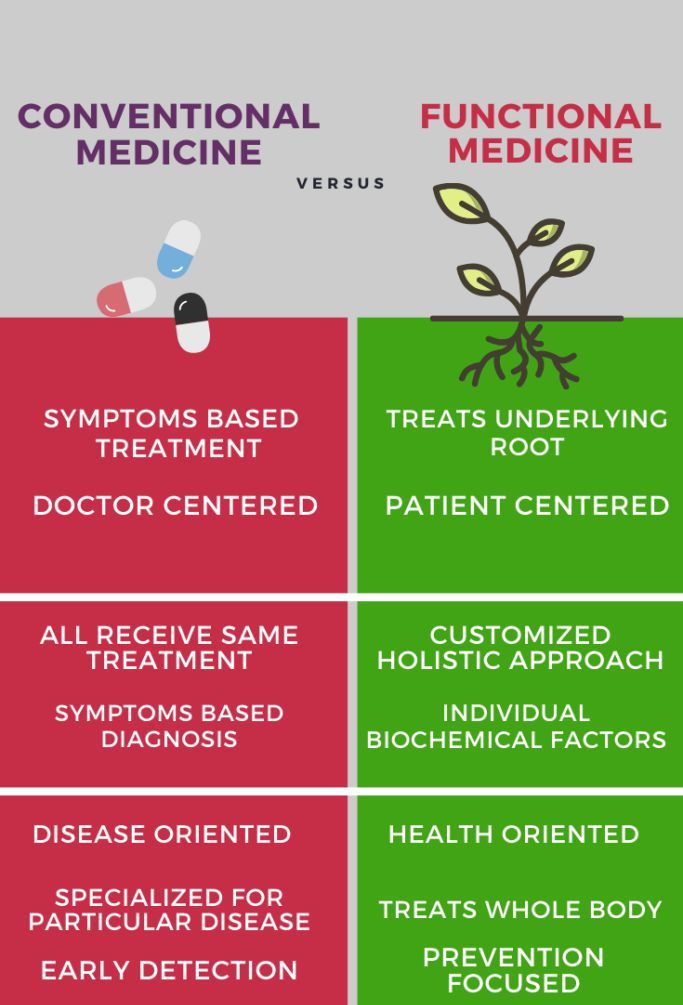Exploring the Framework Behind Functional Medicine and Its Patient-Centered Approach
Introducing the Recovery Techniques of Functional Medicine and Holistic Medicine for Optimal Well-being
The exploration of functional and holistic medicine exposes distinct yet linked pathways to wellness (Holistic Medicine). Functional medicine seeks to discover the underlying root causes of ailments, while alternative medicine welcomes a bigger perspective of wellness that consists of spiritual and psychological measurements. Together, these strategies provide a framework for individuals to take charge of their wellness trips. This discussion will highlight the concepts, techniques, and differences in between these techniques, welcoming further consideration of their consolidated capacity
Comprehending Functional Medicine: Principles and Practices
Functional medicine represents a standard change in medical care, stressing a patient-centered technique that seeks to deal with the origin and recognize reason for illness. This model incorporates scientific study with professional experience, viewing clients as one-of-a-kind individuals instead than mere signs and symptoms of a condition. Specialists of useful medicine employ a systems biology point of view, exploring the interactions between hereditary, environmental, and way of living aspects that contribute to health and wellness outcomes.
Secret concepts include tailored treatment plans tailored to the person's particular demands, cultivating a collective connection between individual and specialist. Functional medicine likewise prioritizes precautionary treatment, concentrating on way of life adjustments, nutrition, and tension monitoring to support overall well-being. This method encourages people to take an active function in their health, causing boosted end results and a much deeper understanding of their problems. Inevitably, functional medicine intends to recover balance and advertise health, changing the health care experience into among empowerment and holistic recovery.

The Holistic Medicine Technique: Integrating Mind, Body, and Spirit
While several medical care techniques concentrate solely on physical signs, alternative medicine emphasizes the interconnectedness of mind, body, and spirit in the quest of suitable wellness. This integrative approach acknowledges that psychological and emotional variables significantly influence physical health, leading specialists to consider the entire person during therapy. Holistic medicine utilizes varied techniques, including reflection, way of living, and nutrition adjustments, to promote balance and harmony within the person.
Professionals typically engage clients in conversations regarding their emotions, relationships, and life experiences, recognizing that these elements can impact total wellness. By attending to underlying issues and advertising self-awareness, alternative medicine aims to empower individuals in their recovery trip. Functional Medicine. This paradigm change motivates an aggressive approach to health, supporting for safety nets and way of living changes as opposed to simply treating signs and symptoms. Inevitably, holistic medicine seeks to grow a much deeper connection between mind, spirit, and body, promoting thorough wellness and individual growth

Key Differences Between Functional and Holistic Medicine
Although both functional and holistic medicine prioritize detailed individual treatment, they differ noticeably in their approaches and philosophies. Functional medicine highlights a systems-oriented approach, concentrating on determining and treating the underlying sources of conditions. Experts commonly make use of innovative analysis screening and tailored treatment strategies, which may include way of life modifications, supplements, and drugs to bring back balance within the body's systems.
In comparison, holistic medicine takes on a more comprehensive perspective, thinking about the emotional, spiritual, and environmental aspects influencing a patient's wellness. It seeks to promote overall wellbeing via a combination of alternate therapies, such as yoga, acupuncture, and reflection, alongside conventional treatments.

Common Conditions Dealt With by Functional and Holistic Medicine
Lots of individuals look for both functional and holistic medicine for a range of usual wellness conditions. These methods are often employed to deal with persistent diseases such as diabetes mellitus, high blood pressure, and autoimmune problems (Learn More). Functional medicine concentrates on identifying underlying reasons with detailed evaluations, while all natural medicine emphasizes the interconnectedness of the body, mind, and spirit
Psychological wellness concerns, including anxiety and depression, are additionally regularly treated within these frameworks, as they take into consideration mental and emotional factors alongside physical signs and symptoms. Furthermore, digestive system conditions like cranky bowel disorder (IBS) and food sensitivities prevail worries, with both techniques supporting for nutritional alterations and way of living adjustments.
Individuals might likewise turn to these modalities for problems such as fatigue syndrome and fibromyalgia, where traditional therapies might fail. By incorporating various healing methods, alternative and practical medicine purpose to foster general well-being and boost lifestyle for those affected.
How to Select the Right Approach for Your Wellness Journey
Just how does one establish one of the most appropriate health strategy among the myriad of alternatives readily available? The choice in between practical and alternative medicine calls for mindful factor to consider of specific demands and preferences. One must examine their health and wellness goals, whether they seek symptom relief or a much deeper understanding of underlying concerns. Next off, assessing one's case history and present conditions can supply clearness on which technique may be most beneficial.
Consultation with healthcare professionals experienced in both fields can provide beneficial understandings. Recognizing the principles of each approach-- practical medicine's concentrate on biological systems and alternative medicine's focus on the whole person-- can aid in making an enlightened option. Additionally, taking into consideration personal worths and convenience with treatment techniques, such as nutritional adjustments or different treatments, is essential. Eventually, a customized technique that aligns with one's way of life and ideas will promote a more efficient health trip.
Frequently Asked Concerns
Are Functional and Holistic Medicine Covered by Insurance Coverage Strategies?
Insurance protection for all natural and useful medicine varies considerably by strategy and company - Learn More. Some insurer may provide partial compensation, while others do not cover these alternate techniques in all, requiring out-of-pocket payments from clients
For How Long Does Therapy Normally Absorb These Methods?
Treatment duration in useful and all natural medicine differs extensively, typically varying from a couple of weeks to numerous months. Factors influencing this consist of private health problems, treatment strategies, and the client's commitment to way of life adjustments.
Can I Combine Functional and Holistic Medicine With Standard Treatments?
Yes, individuals can incorporate all natural and practical medicine with traditional therapies. This integrative strategy may improve overall health and wellness, however consulting health care service providers is vital to ensure safety and performance in managing treatment plans.
What Qualifications Should Practitioners of These Strategies Have?
Professionals of practical and holistic medicine should have relevant levels in medicine or health and wellness scientific researches, together with specialized training in their respective areas - Learn More. Resources Certifications from acknowledged companies improve reputation and guarantee adherence to established standards of treatment
Exist Details Diet Regimens Recommended in Functional or Holistic Medicine?

In all natural and useful medicine, particular diet regimens commonly include whole foods, plant-based options, and elimination diet regimens tailored to individual demands. Emphasis exists on nutrient density and preventing refined foods to boost total health and wellness and well-being.
Functional medicine seeks to reveal the underlying reasons of disorders, while all natural medicine welcomes a broader viewpoint of health that consists of spiritual and psychological measurements. While practical medicine is much more scientifically oriented, emphasizing organic processes, holistic medicine stresses the interconnectedness of different life elements. Lots of individuals seek both holistic and useful medicine for a selection of typical health problems. Recognizing the principles of each strategy-- practical medicine's focus on organic systems and alternative medicine's focus on the whole individual-- can aid in making an informed selection. Professionals of functional and alternative medicine ought to have relevant levels in medicine or health sciences, alongside specialized training in their particular areas.